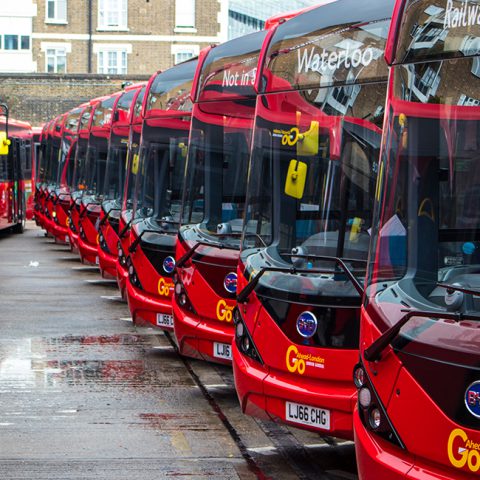Go-Ahead Group to become a carbon neutral company by 2045
Go-Ahead’s entire fleet of 5,000 UK buses will be converted to zero emission vehicles by 2035. It’s just one of the pillars of the company’s strategy to reach carbon neutrality by 2045. The Go-Ahead Group sets out a strategy to lead the transport industry in carbon reduction by achieving a 75% cut in emissions by […]

Go-Ahead’s entire fleet of 5,000 UK buses will be converted to zero emission vehicles by 2035. It’s just one of the pillars of the company’s strategy to reach carbon neutrality by 2045.
The Go-Ahead Group sets out a strategy to lead the transport industry in carbon reduction by achieving a 75% cut in emissions by 2035, and by becoming a fully carbon neutral company by 2045. London’s largest electric bus garage in Northumberland Park will begin “bus to grid” feed of energy into UK power network.
The exacting targets are the most ambitious in the industry and will be achieved through a combination of investment in zero-carbon technology, a crackdown on waste and a significant increase in reuse and recycling of materials, the company says.
Go-Ahead Group: carbon neutral through a shift away from diesel
Submitted to the Science Based Targets Initiative for ratification, the timetable is in keeping with an overall mission set under the Paris Agreement to limit global warming to 1.5°C by 2050. Changes to Go-Ahead’s business will be accompanied by initiatives to encourage active travel, and the company today calls on the Government to encourage a shift from car use to walking, cycling and public transport.
At the heart of Go-Ahead’s strategy will be a wholesale shift in technology from diesel power to zero-carbon modes of transport – including electric and hydrogen power. Calling points along Go-Ahead’s journey to decarbonisation include, as outlined in the group’s press note:
- Converting Go-Ahead’s entire fleet of 5,000 UK buses to zero emission vehicles by 2035
- A decarbonized rail fleet by 2035
- Improvements to air quality by 2025 through a 17% drop in carbon monoxide emissions, a 49% cut in hydrocarbons, a 63% fall in nitrogen oxides and a 55% cut in particulate matter from vehicles
- A 25% reduction in water use by 2025 through a significant reduction in leakage, together with responsible management in all operations
- A significant improvement in energy efficiency at all Go-Ahead premises by 2035
- Reduction of overall waste volumes and recycling of 60% of waste by 2025
Since 2016, Go-Ahead has already achieved a 22% reduction in emissions, in spite of expansion of the business. Go-Ahead is ranked ‘A minus’ by the Carbon Disclosure Project – the highest of any UK transport operator.
Go-Ahead bets on zero emission buses
The group operates Britain’s first air filtering buses, which remove particulate pollution from the air as they travel the streets of Southampton. Buses with geofencing technology automatically switch to zero-carbon mode when they enter Brighton’s city centre, and Go-Ahead is piloting solar panels on buses in Britain and Singapore.
In a further step this summer, the company anticipates implementation of “bus to grid” energy at Northumberland Park depot in north London. This project, in partnership with SSE Enterprise, BYD, Leeds University and UK Power Networks, will turn the bus depot into a virtual power station, with electric batteries from buses able to feed energy back into the grid at times of high demand.
Northumberland Park is the largest electric bus depot in Europe. An initial trial will use batteries from 28 double-decker buses, capable of returning over a megawatt of energy to the grid.
Go-Ahead to become a carbon neutral company
David Brown, Chief Executive of The Go-Ahead Group, said: “Climate change is the number one challenge facing society and in order to address it, we must make radical changes to the way we travel. If we’re serious about protecting the health of our planet, then businesses such as Go-Ahead must show leadership. Our climate change plan is ambitious but deliverable, and is consistent with international goals of limiting any increase in global temperature to 1.5°C. We will play our part by decarbonising our business and by investing in environmentally sustainable technology. We hope our commitment will be matched by a broader shift in public policy on transport by encouraging people to walk or cycle where possible, use buses and trains as an alternative but only use a car if absolutely necessary.”






